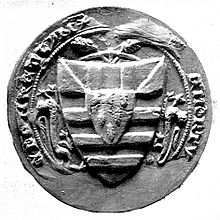Roger Mortimer, Baron of Chirk
| Roger Mortimer, Baron of Chirk | |
|---|---|
 |
|
| Born | c.1260 |
| Died | 1326 |
| Nationality | English |
| Occupation | Soldier and nobleman |
| Known for | Opposition to Edward II during the Despenser War |
Roger Mortimer de Chirk (c.1256 - 3 August 1326) was a 14th-century Marcher lord, notable for his opposition to Edward II of England during the Despenser War.
Roger was the third son of Roger Mortimer, a powerful Marcher lord in the Welsh border territories, and Maud de Braose, Baroness Mortimer who was also an important Marcher landowner in her own right. The family were from the second rank of parvenu nobility elevated by the king as a reward for fierce loyalty to the Plantagenet dynasty. But he was said to be a lecherous and violent man.
He married Lucy de la Wafre, the daughter of Sir Robert la Wavre Lord of Hampton Wafer, Herefordshire, by whom he had one legitimate son, also named Roger. Presumably they were married by 8 June 1286, when Roger de Mortimer presented at the manor of Tedstone Wafer.
In 1277, the Lord of North Powys died leaving two young sons. Mortimer was appointed by King Edward Longshanks to be their guardian. Four years later their bodies washed up in the River Dee, and Mortimer was accused of their murder. They were the last in a royal line, and Mortimer, guilty or not, was granted their lands. It is possible that Mortimer needed the lands to raise his nephew, Roger, as his guardian.
In 1282, the Welsh wars broke out, and Chirk, a professional soldier, was a Captain in the royal army. At some point, probably after 1295, he began work on Chirk Castle, possibly designed by James of St George, the architect of Beaumaris Castle, but the castle remained unfinished at the time of Lord Chirk's death.
Mortimer fought at the Battle of Falkirk in 1298 when William Wallace was finally defeated. On 6 February he was created Lord of Chirk. The Mortimers supported the King's policy in Scotland and on the Marches. Chirk pledged allegiance to Edward II, and was with the young King when he went to negotiate his marriage with Isabella of France. They arrived at Dover on 19 January 1308, and Mortimer left Edward to cross the channel. On 22 May 1306, Mortimer was knighted at Westminster during Whitsuntide, thus his title made him of a suitable rank as an escort to the king.
...
Wikipedia
